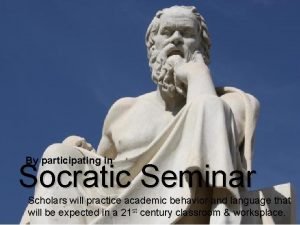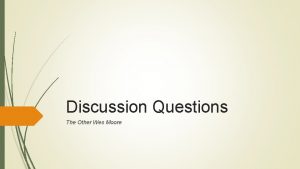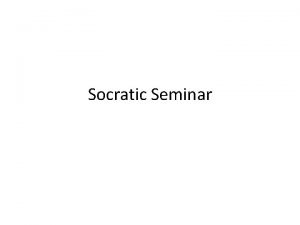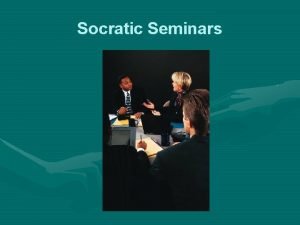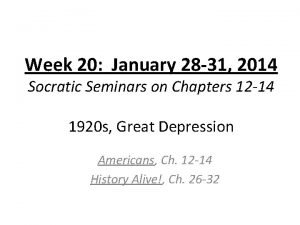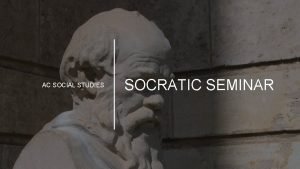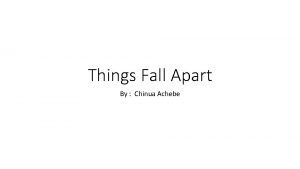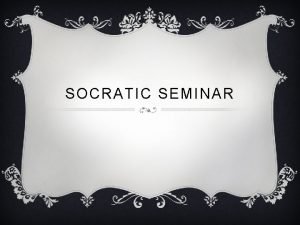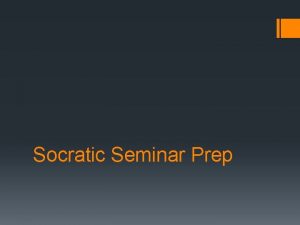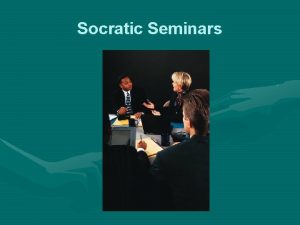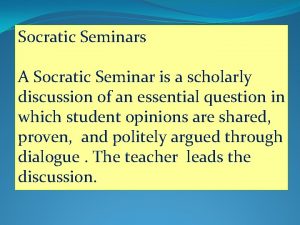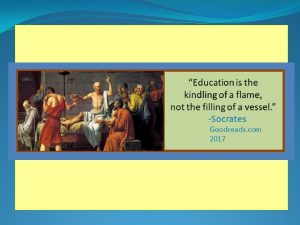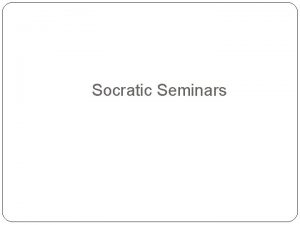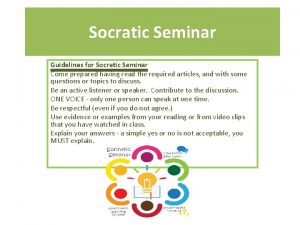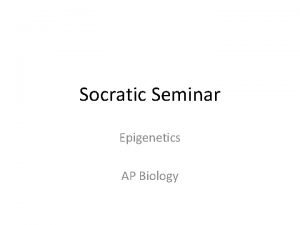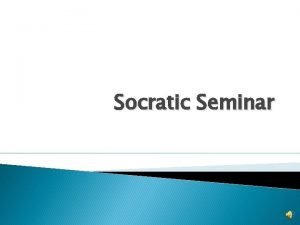Socratic Seminars What is a Socratic seminar An














- Slides: 14

Socratic Seminars

What is a Socratic seminar? • An organized discussion forum to explore a universal question relating to a text/group of texts • Participants are in two groups – observers and discussers. • The roles switch halfway through seminar • The point is to discuss ideas and make connections!


The Rules - Discussers • Inner circle • Be aware of the intricacies of discussion. Take turns, but have it be organic. Have a balance! • As you make statements and refer to the text, focus on continuing the conversation. • Try to promote open-ended questioning and divergent thinking and responses. • A tolerant, open atmosphere is maintained at all times – everyone’s viewpoint is valuable and welcome. This is a dialogue, not a debate.


The Rules - Observers • Outer circle • Observers do not talk, but listen and take notes • Observers: this is your chance to consider OTHERS’ ideas related to a topic, without giving in to the urge to jump in with YOUR opinion. • Things to write down: – Statements/questions you agree/disagree with – Interesting or unusual connections (to text or real life) – Your own questions/thoughts in response to statements made


During Seminar: Good Participation: Poor Participation: -Making analogies -Making a relevant point -Responding to a question -Drawing another person into conversation -Using factual or specific evidence -Asking a clarifying question -Moving the discussion along -Not paying attention -Distracting others -Interrupting -Irrelevant comments -Monopolizing -Personal attacks

Socratic Seminar Preparation: Questions Close-ended question – Write a question about the text that will help everyone in the class come to agreement about events or characters in the text. - These have right or wrong answers - Who, What, Where, When questions - Example: Where did Thoreau go and why did he go there (in the excerpt from “Where I Lived, and What I Lived For”)?

Socratic Seminar Preparation: Questions Open-ended question – What does it mean? You can find the answer in the text, but it requires justification. - WHY or HOW questions - Example: Why does Wilson include both hypothetical texts as part of his essay “The Future of Life”? How does this help to achieve his purpose?

Socratic Seminar Preparation: Questions World connection question – Write a question connecting the text to the real world. - Would you separate yourself from society like Thoreau did? If yes, for how long? If no, why not?

Socratic Seminar Preparation: Questions Universal – why does it matter? BIG questions dealing with themes of the text with no one correct answer. - Why do humans destroy (or preserve) nature? - Why do humans tell others about their experiences? - What is the relationship between frontier, nature, humanity, and hope?

Seminar Grading • Summative scores for 1 st semester • SL. 11 -12. 1. a - Come to discussions prepared; explicitly draw on that preparation by referring to evidence from texts and other research on the topic or issue to stimulate a thoughtful, well-reasoned exchange of ideas. • SL. 11 -12. 1. b - Work with peers to promote civil, democratic discussions and decision-making, set clear goals and deadlines, and establish individual roles as needed. • SL. 11 -12. 1. c – Propel conversations by posing and responding to questions that probe reasoning and evidence; ensure a hearing for a full range of positions on a topic or issue; clarify, verify, or challenge ideas and conclusions; etc.

Today’s Assignment: • Write 2 -3 of each question type: – close-ended questions – open-ended questions – world connection questions – universal theme questions – Use the four texts from the nature unit. You may make connections to other texts/current events as well. This is due at the end of the period.
 Socratic seminar definition
Socratic seminar definition Socratic
Socratic The other wes moore socratic seminar questions
The other wes moore socratic seminar questions Define socratic seminar
Define socratic seminar The things they carried socratic seminar questions
The things they carried socratic seminar questions Define socratic seminar
Define socratic seminar Socratic seminar images
Socratic seminar images Socratic seminar images
Socratic seminar images Socratic seminar ground rules
Socratic seminar ground rules Hamlet socratic seminar questions
Hamlet socratic seminar questions Socratic seminar rules of engagement
Socratic seminar rules of engagement Discussion questions the glass castle
Discussion questions the glass castle Things fall apart socratic seminar questions
Things fall apart socratic seminar questions Too late to apologize declaration of independence
Too late to apologize declaration of independence Socratic seminar definition
Socratic seminar definition

